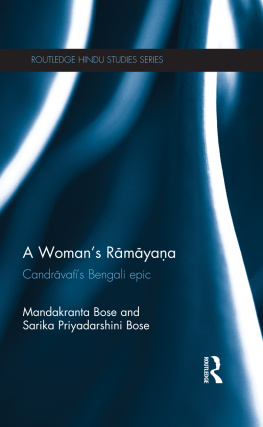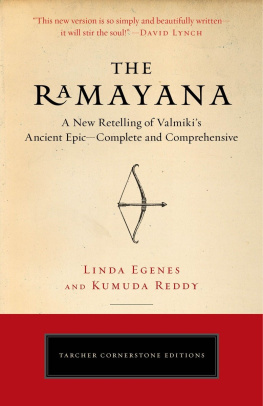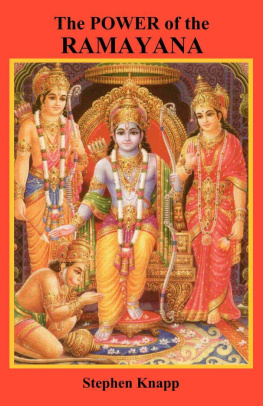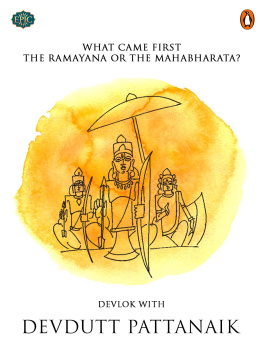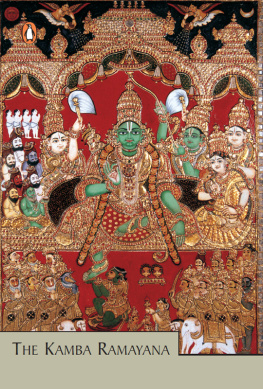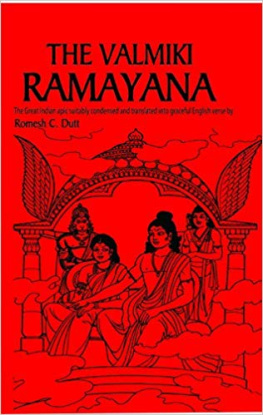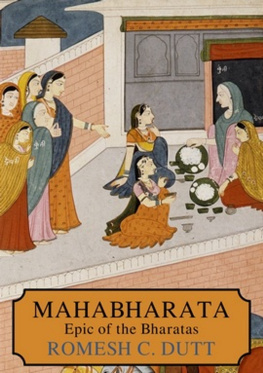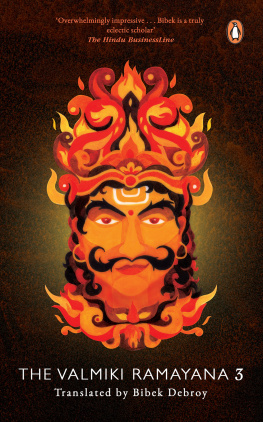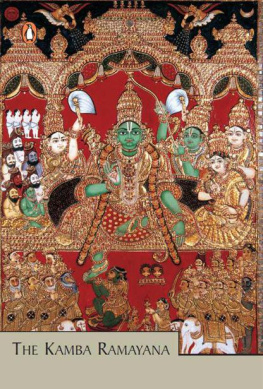
A Womans Rmyaa
The Rmyaa, an Indian epic, is one of the worlds best-loved stories. Made available in English for the first time, this version by a female poet from Bengal is very direct, touching, timely, and accessible. The three-part poem is a highly individual rendition of the ancient epic, and instead of celebrating masculine heroism it laments the suffering of women caught in the play of male ego.
This book presents a translation and commentary on the text, and provides readers with an alternative view of the tale. It expands the understanding both of the history of womens self-expression in India and the cultural potency of the epic tale. The book should be of interest to students and researchers of South Asian studies, Rmyaa studies and womens and gender studies.
Mandakranta Bose is Professor Emerita at the University of British Columbia, Canada. She has published widely on the classical performing arts and literature of India, gender studies and Hinduism.
Sarika Priyadarshini Bose is Lecturer in English at the University of British Columbia, Canada. Her research interests include Victorian literature, childrens literature, gender studies and composition.
Routledge Hindu Studies Series
Series Editor: Gavin Flood
Oxford Centre for Hindu Studies

The Routledge Hindu Studies Series, in association with the Oxford Centre for Hindu Studies, intends the publication of constructive Hindu theological, philosophical and ethical projects aimed at bringing Hindu traditions into dialogue with contemporary trends in scholarship and contemporary society. The series invites original, high quality, research level work on religion, culture and society of Hindus living in India and abroad. Proposals for annotated translations of important primary sources and studies in the history of the Hindu religious traditions will also be considered.
Epistemologies and the Limitations of Philosophical Inquiry
Doctrine in Madhva Vedanta
Deepak Sarma
A Hindu Critique of Buddhist Epistemology
Kumarila on perception
The Determination of Perception chapter of Kumarilabhattas
Slokarvarttika translation and commentary
John Taber
Samkaras Advaita Vedanta
A way of teaching
Jacqueline Hirst
Attending Krishnas Image
Chaitanya Vaishnava Murti-seva as devotional truth
Kenneth Russell Valpey
Advaita Vedanta and Vaisnavism
The Philosophy of Madhusudana Sarasvati
Sanjukta Gupta
Classical Samkhya and Yoga
An Indian metaphysics of experience
Mikel Burley
Self-Surrender (Prapatti) to God in Shrivaishnavism
Tamil cats and Sanskrit monkeys
Srilata Raman
The Chaitanya Vaishnava Vedanta of Jiva Gosvami
When knowledge meets devotion
Ravi M. Gupta
Gender and Narrative in the Mahabharata
Edited by Simon Brodbeck and Brian Black
Yoga in the Modern World
Contemporary perspectives
Edited By Mark Singleton and Jean Byrne
Consciousness in Indian Philosophy
The Advaita doctrine of awareness only
Sthaneshwar Timalsina
Desire and Motivation in Indian Philosophy
Christopher G. Framarin
Women in the Hindu Tradition
Rules, roles and exceptions
Mandakranta Bose
Religion, Narrative and Public Imagination in South Asia
Past and place in the Sanskrit Mahabharata
James Hegarty
Interpreting Devotion
The poetry and legacy of a female Bhakti saint of India
Karen Pechilis
Hindu Perspectives on Evolution
Darwin, dharma, and design
C. Mackenzie Brown
Pilgrimage in the Hindu Tradition
Salvific space
Knut A. Jacobsen
A Womans Rmyaa
Candrvats Bengali epic
Translated with Introduction and Notes by Mandakranta Bose and Sarika Priyadarshini Bose
A Womans Rmyaa
Candrvats Bengali epic
Translated with Introduction and Notes by
Mandakranta Bose and Sarika Priyadarshini Bose

First published 2013
by Routledge
2 Park Square, Milton Park, Abingdon, Oxon OX14 4RN
Simultaneously published in the USA and Canada
by Routledge
711 Third Avenue, New York, NY 10017
Routledge is an imprint of the Taylor & Francis Group, an informa business
2013 Mandakranta Bose and Sarika Priyadarshini Bose
The right of Mandakranta Bose and Sarika Priyadarshini Bose to be identified as authors of this work has been asserted by them in accordance with sections 77 and 78 of the Copyright, Designs and Patents Act 1988.
All rights reserved. No part of this book may be reprinted or reproduced or utilised in any form or by any electronic, mechanical, or other means, now known or hereafter invented, including photocopying and recording, or in any information storage or retrieval system, without permission in writing from the publishers.
Trademark notice: Product or corporate names may be trademarks or registered trademarks, and are used only for identification and explanation without intent to infringe.
British Library Cataloguing in Publication Data
A catalogue record for this book is available from the British Library
Library of Congress Cataloging in Publication Data
Candravati, active 16th century.
[Ramayana. English]
A Womans Ramayana : Candravatis Bengali epic / Mandakranta Bose and Sarika Priyadarshini Bose.
pages cm. (Routledge Hindu studies series)
Includes bibliographical references and index.
1. Candravati, active 16th century. Ramayana. 2. Valmiki. Ramayana. 3. Women in HinduismIndiaBengalHistory16th cent. I. Bose, Mandakranta, 1938- II. Bose, Sarika Priyadarshini. III. Valmiki. Ramayana. IV. Title.
BL1139.25.C3613 2013
294.592204521dc23
2012033398
ISBN: 978-0-415-62529-6 (hbk)
ISBN: 978-0-203-44148-0 (ebk)
Typeset in Times New Roman
by Deer Park Productions
In memory of
Tripti Rini Bose
Loving Mother-in-law and Grandmother
Contents
Illustrations
This book grew out of our attempts to answer the question we and our students have long been asking about how women view epic tales, traditionally told as battle stories glorifying feats of arms, the only argument Heroick deemd, as Milton put it. Looking for an alternative understanding of heroism outside what is known as mainstream texts, itself a questionable term as one that privileges convention, we found in a little-known area of world culture a poem by an author virtually unknown till very recent times and till now inaccessible to most readers as so many works are when they are in non-European languages. Nor is it accidental that the author, Candrvat, happens to be a woman and her poem a kind of inside-out rewrite of one of the most revered and influential epics originating in India, the epic Rmyaa. A much shorter version of that long narrative, Candrvats Rmyaa is centred on the sufferings of its female protagonist, St, rather than on the prowess of her all-conquering husband, Rma. In her revisionary version of the epic as a scrutiny of the human cost of conflict and the justice meted out by the strong to the weak, Candrvat joins other tellers of this ancient myth, such as working women in many parts of India and rural poets, but her poem deserves a particularly careful reading because it is a sustained rather than occasional alignment with victims of power.
Next page
